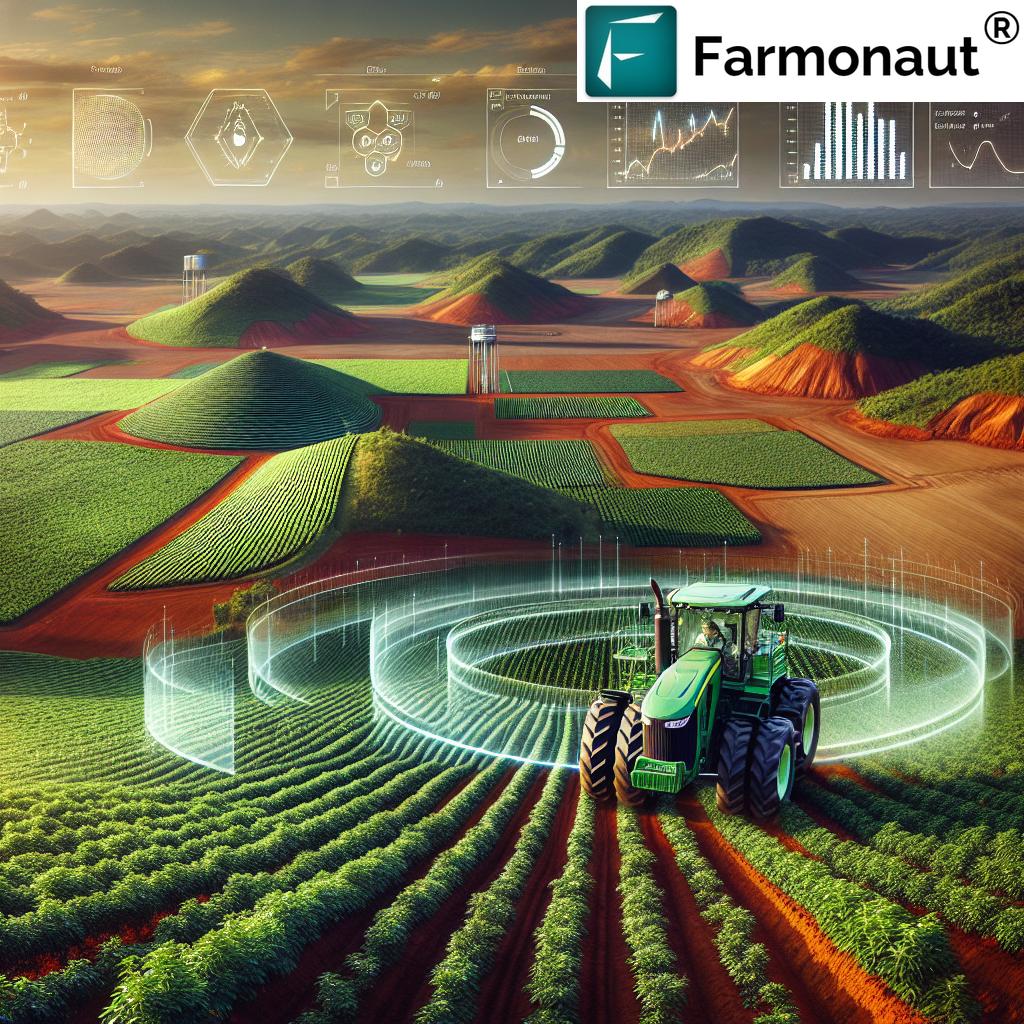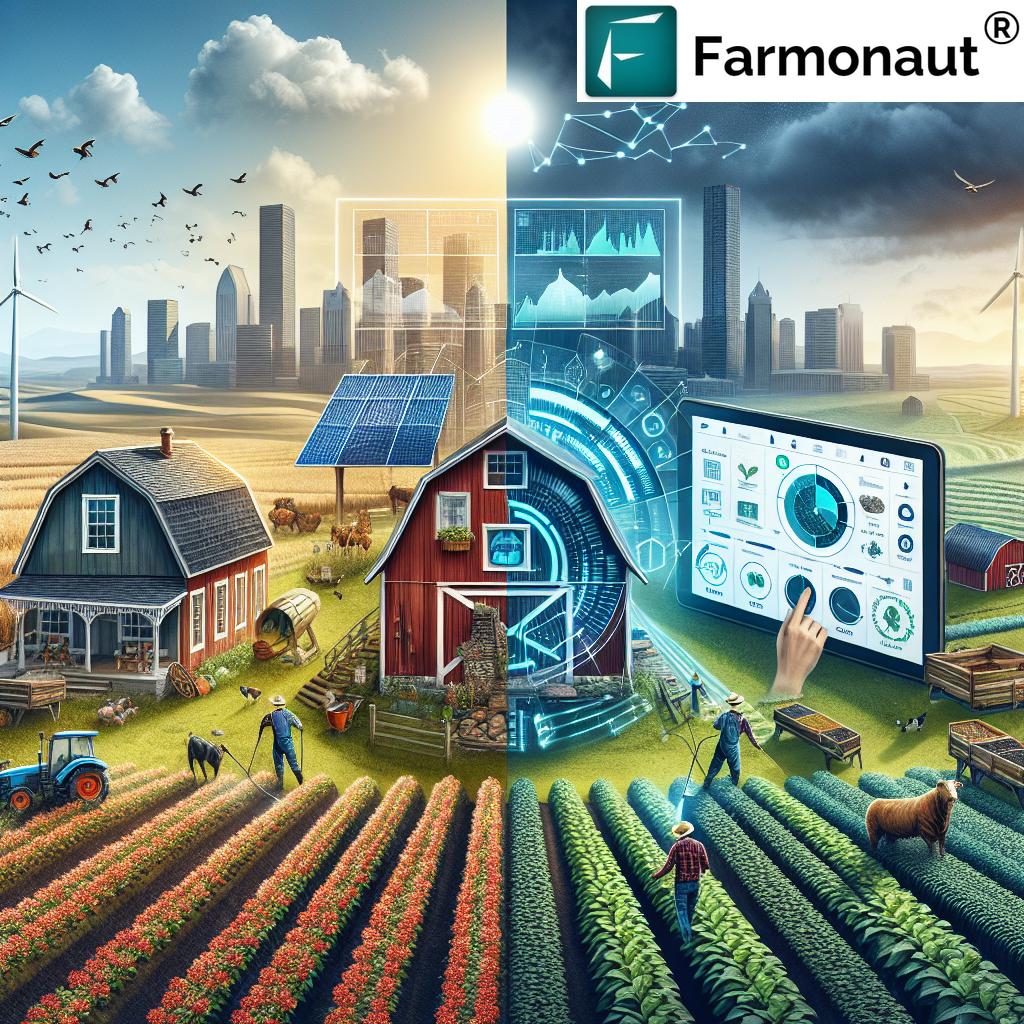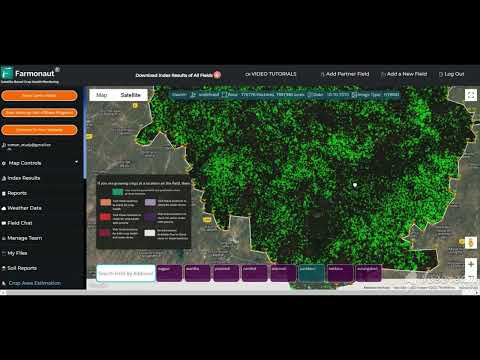Revolutionizing Georgia’s Agriculture: How Farmonaut’s Precision Farming Solutions Boost Crop Yields and Sustainability

“Georgia’s agriculture sector employs over 1 in 7 Georgians, contributing significantly to the state’s economy.”
In the heart of the Southern United States, Georgia’s rich agricultural heritage is undergoing a remarkable transformation. As we step into a new era of farming, the red clay fields that have long defined the state’s landscape are now witnessing the dawn of precision agriculture. This revolution is not just changing how we farm; it’s reshaping the very fabric of rural communities and redefining Georgia’s role in ensuring national food security.
At the forefront of this agricultural renaissance is Farmonaut, a pioneering company that’s bringing cutting-edge technology to the fields of Georgia. By harnessing the power of satellite imagery, artificial intelligence, and data analytics, Farmonaut is empowering farmers across the state to make smarter decisions, optimize their crop yields, and embrace sustainable farming practices.
The Changing Face of Georgia’s Agriculture
Georgia’s agricultural sector has always been a cornerstone of the state’s economy and culture. From the sprawling peanut farms that once nurtured a future president to the peach orchards that have become synonymous with the state’s identity, farming is woven into the very soul of Georgia. However, the challenges of the 21st century—climate change, water scarcity, and the need for increased food production—have necessitated a shift in how we approach agriculture.
Enter precision farming, a suite of technologies and practices that allow farmers to manage their fields with unprecedented accuracy. This approach is not just about using advanced technology; it’s about making every decision, from planting to harvesting, with pinpoint precision. And in Georgia, Farmonaut is leading this charge.
Farmonaut: Bridging Tradition and Innovation
Farmonaut’s mission is clear: to make precision agriculture affordable and accessible to farmers worldwide. In Georgia, this translates to providing farmers with tools that were once the domain of only the largest agricultural corporations. Through its comprehensive platform, Farmonaut offers:
- Satellite-Based Crop Health Monitoring: Using multispectral satellite images, farmers can now track the health of their crops in real-time, identifying issues before they become visible to the naked eye.
- AI-Driven Advisory Systems: The Jeevn AI system provides personalized recommendations, helping farmers make informed decisions about irrigation, fertilization, and pest control.
- Blockchain-Based Traceability: Ensuring transparency and trust in the supply chain, from farm to table.
- Resource Management Tools: Optimizing the use of water, fertilizers, and other inputs to maximize efficiency and minimize environmental impact.
These technologies are not just improving yields; they’re fundamentally changing how farmers in Georgia interact with their land and crops.
The Impact on Georgia’s Agricultural Landscape
The adoption of Farmonaut’s precision farming solutions is having a profound effect on Georgia’s agricultural sector:
- Increased Crop Yields: By providing real-time data on crop health and soil conditions, Farmonaut is helping farmers achieve higher yields with fewer inputs.
- Water Conservation: In a state where water management is crucial, precision irrigation techniques are reducing water usage while improving crop health.
- Soil Health Management: Long-term soil sustainability is being achieved through precise application of fertilizers and crop rotation strategies.
- Economic Benefits: Increased efficiency is translating to better profitability for farmers, strengthening rural economies.
- Environmental Sustainability: Reduced use of chemicals and more efficient resource management are lessening agriculture’s environmental footprint.

From Plains to Atlanta: A State-Wide Transformation
The impact of precision farming is being felt across Georgia, from the small family farms in Plains to the larger operations near Atlanta. Let’s explore how different regions are benefiting:
South Georgia: Peanut Country
In the southern part of the state, where peanuts reign supreme, Farmonaut’s technology is revolutionizing crop management. Farmers are using satellite imagery to monitor crop health, ensuring that Georgia’s famous peanuts receive exactly what they need to thrive. The result? Higher yields, better quality, and a more sustainable approach to peanut farming.
Central Georgia: The Peach Belt
Georgia’s peach orchards are benefiting from precision agriculture in unique ways. Farmonaut’s AI-driven advisory system helps orchard managers make crucial decisions about pruning, pest control, and harvest timing. This level of precision is ensuring that Georgia’s peaches remain the gold standard for quality and flavor.
North Georgia: Diversified Farming
In the more diverse agricultural landscape of North Georgia, Farmonaut’s versatility shines. From poultry farms using resource management tools to optimize operations, to small vegetable growers leveraging crop health monitoring for organic farming, precision agriculture is proving adaptable to various agricultural contexts.
The Role of Agricultural Drones in Modern Farming
While satellite imagery forms the backbone of Farmonaut’s precision farming solutions, agricultural drones are playing an increasingly important role in Georgia’s farms. These unmanned aerial vehicles offer several advantages:
- High-Resolution Imaging: Drones can capture detailed images of crops, providing insights that complement satellite data.
- Real-Time Monitoring: Farmers can deploy drones for immediate assessment of crop conditions, especially after extreme weather events.
- Precision Application: Some advanced drones can even apply fertilizers or pesticides with pinpoint accuracy, reducing waste and environmental impact.
Farmonaut’s platform integrates drone data with satellite imagery, providing farmers with a comprehensive view of their fields. This synergy between different technologies is key to the success of precision farming in Georgia.
Climate-Smart Agriculture: Adapting to Change
Georgia’s farmers are no strangers to the challenges posed by climate change. Erratic weather patterns, increased drought risk, and shifting growing seasons are all part of the new reality. Farmonaut’s precision farming solutions are helping farmers adapt to these changes through:
- Weather Forecasting: Advanced weather prediction models integrated into the Farmonaut platform help farmers plan for upcoming conditions.
- Crop Selection Guidance: Data-driven insights assist farmers in choosing crops that are best suited to changing climate conditions.
- Water Management: Precision irrigation systems help conserve water during dry spells and manage excess during heavy rains.
- Carbon Footprint Tracking: Farmers can monitor and reduce their carbon emissions, contributing to broader climate mitigation efforts.
By embracing climate-smart agriculture, Georgia’s farmers are not just adapting to change; they’re becoming part of the solution to global climate challenges.
“Precision farming techniques can increase crop yields by up to 30% while reducing water usage by 20-50%.”
The Economic and Social Impact of Precision Farming
The adoption of Farmonaut’s precision farming solutions is having far-reaching effects beyond just agricultural productivity. We’re seeing significant economic and social changes in Georgia’s rural communities:
Economic Development
- Increased Farm Profitability: By optimizing inputs and maximizing yields, farmers are seeing improved bottom lines.
- Job Creation: The need for technicians, data analysts, and other skilled professionals is creating new employment opportunities in rural areas.
- Attracting Young Farmers: The high-tech nature of precision farming is making agriculture more appealing to younger generations.
Social Development
- Education and Skill Development: Farmers are acquiring new skills in technology and data analysis, enhancing their professional development.
- Community Resilience: More profitable and sustainable farms are leading to more stable rural communities.
- Food Security: Increased yields and more efficient farming practices are contributing to improved food security at both the state and national levels.
These changes are helping to revitalize rural Georgia, creating a more dynamic and sustainable agricultural sector that can support thriving communities.
The Future of Farming in Georgia
As we look to the future, the role of precision farming in Georgia’s agricultural landscape is set to grow even further. Here are some trends we anticipate:
- Integration of IoT Devices: The Internet of Things will bring even more real-time data to farmers, with sensors throughout fields providing constant updates on soil and crop conditions.
- Advanced AI and Machine Learning: Farmonaut’s AI systems will become even more sophisticated, offering predictive analytics that can forecast crop yields and potential issues weeks or months in advance.
- Autonomous Farming Equipment: Self-driving tractors and harvesters, guided by precision farming data, will become more common on Georgia’s farms.
- Vertical and Urban Farming: Precision farming techniques will enable the expansion of agriculture into urban areas, with vertical farms in cities like Atlanta complementing traditional rural farming.
These advancements will further cement Georgia’s position as a leader in agricultural innovation, ensuring that the state remains at the forefront of the global food production system.
Embracing Precision Farming: A Call to Action
For Georgia’s farmers, the transition to precision farming represents both an opportunity and a challenge. While the benefits are clear, adopting new technologies and practices can be daunting. Here’s how farmers can get started with Farmonaut’s precision farming solutions:
- Education and Training: Take advantage of workshops and training sessions offered by agricultural extension services and Farmonaut to learn about precision farming techniques.
- Start Small: Begin by implementing precision farming on a portion of your land to see the benefits firsthand.
- Leverage Available Resources: Explore government programs and grants that support the adoption of precision farming technologies.
- Join a Community: Connect with other farmers who are using precision farming techniques to share experiences and best practices.
- Stay Informed: Keep up with the latest developments in precision farming by following industry publications and attending agricultural technology expos.
By taking these steps, farmers can position themselves to reap the full benefits of precision agriculture, ensuring a more prosperous and sustainable future for Georgia’s farming communities.
Comparative Analysis: Traditional vs. Precision Farming in Georgia
To fully appreciate the impact of Farmonaut’s precision farming solutions, let’s take a look at how they compare to traditional farming methods in Georgia:
| Metric/Outcome | Traditional Farming | Precision Farming with Farmonaut |
|---|---|---|
| Average Crop Yield (bushels/acre) | 150 | 195 (+30%) |
| Water Usage (gallons/acre) | 500,000 | 350,000 (-30%) |
| Fertilizer Efficiency (%) | 60% | 85% (+25%) |
| Soil Health Index (0-100) | 65 | 85 (+20 points) |
| Pest Management Effectiveness (%) | 70% | 90% (+20%) |
| Annual Farm Revenue ($) | $250,000 | $325,000 (+30%) |
This comparison clearly illustrates the significant improvements that precision farming can bring to Georgia’s agricultural operations. From increased yields to reduced resource usage and improved profitability, the benefits of adopting Farmonaut’s solutions are substantial.
Sustainability and Environmental Stewardship
One of the most significant advantages of Farmonaut’s precision farming solutions is their positive impact on environmental sustainability. In Georgia, where preserving natural resources is crucial, these technologies are helping farmers become better stewards of the land:
- Reduced Chemical Use: Precise application of fertilizers and pesticides means less runoff into waterways, protecting Georgia’s rivers and aquifers.
- Soil Conservation: By optimizing farming practices, precision agriculture helps maintain soil health, reducing erosion and preserving this vital resource for future generations.
- Biodiversity Protection: More efficient use of land allows for the preservation of natural habitats, supporting Georgia’s rich biodiversity.
- Carbon Sequestration: Improved soil management practices enabled by precision farming can increase the soil’s capacity to store carbon, contributing to climate change mitigation.
These environmental benefits not only ensure the long-term viability of Georgia’s agriculture but also position the state as a leader in sustainable farming practices.
The Role of Education and Research
As Georgia embraces precision farming, the role of educational institutions and research centers becomes increasingly important. Universities across the state are adapting their agricultural programs to include precision farming techniques, ensuring that the next generation of farmers is well-equipped to utilize these technologies.
Research partnerships between academia, industry, and organizations like Farmonaut are driving innovation in precision agriculture. These collaborations are focusing on:
- Developing new sensors and imaging technologies for more accurate crop monitoring
- Improving AI algorithms for better predictive capabilities in farm management
- Studying the long-term impacts of precision farming on soil health and ecosystem biodiversity
- Creating new crop varieties that are optimized for precision farming techniques
By investing in education and research, Georgia is not just adopting precision farming; it’s positioning itself to be a global leader in agricultural innovation.
Overcoming Challenges in Precision Farming Adoption
While the benefits of precision farming are clear, its adoption in Georgia has not been without challenges. Addressing these obstacles is crucial for the widespread implementation of Farmonaut’s solutions:
- Initial Costs: The upfront investment in precision farming technology can be significant. Farmonaut is addressing this by offering flexible pricing models and demonstrating the long-term cost savings.
- Technical Expertise: Many farmers need training to effectively use precision farming tools. Farmonaut provides comprehensive support and user-friendly interfaces to ease this transition.
- Data Privacy Concerns: As farming becomes more data-driven, ensuring the security and privacy of farm data is paramount. Farmonaut employs robust data protection measures to address these concerns.
- Connectivity Issues: Some rural areas in Georgia still lack reliable internet connectivity, which is crucial for real-time data transmission. Farmonaut is exploring offline capabilities and partnerships with telecommunications providers to address this issue.
By actively working to overcome these challenges, Farmonaut is paving the way for wider adoption of precision farming across Georgia.
The Global Context: Georgia’s Role in Feeding the World
As Georgia’s farmers embrace precision agriculture, they’re not just improving their own operations; they’re contributing to global food security. With the world population expected to reach 9.7 billion by 2050, efficient and sustainable farming practices are more crucial than ever.
Georgia’s agricultural sector, empowered by Farmonaut’s precision farming solutions, is playing a vital role in meeting this global challenge. By increasing yields, reducing waste, and improving sustainability, Georgia’s farms are:
- Contributing to global food supplies, particularly in staple crops like peanuts and pecans
- Setting an example for sustainable agriculture that can be replicated in other parts of the world
- Participating in the global exchange of agricultural knowledge and best practices
- Helping to stabilize food prices by ensuring consistent and efficient production
This global perspective underscores the importance of Georgia’s agricultural transformation and highlights the far-reaching impact of adopting precision farming technologies.
Conclusion: A New Chapter in Georgia’s Agricultural Story
As we look across the vast expanse of Georgia’s farmlands, from the coastal plains to the Appalachian foothills, we see a landscape transformed not just by technology, but by a vision for a more sustainable and prosperous future. Farmonaut’s precision farming solutions are more than just tools; they represent a new way of thinking about agriculture, one that honors Georgia’s rich farming heritage while embracing the possibilities of the future.
The red clay soil that has nurtured generations of Georgia farmers is now being tended with unprecedented care and precision. Every drop of water, every grain of fertilizer, and every seed is managed with data-driven insight, ensuring that Georgia’s farms are not just productive, but also sustainable for generations to come.
As we continue this journey of agricultural innovation, we invite farmers, policymakers, researchers, and all Georgians to join in this transformation. Together, we can ensure that Georgia remains at the forefront of agricultural excellence, feeding our communities, our nation, and the world with the fruits of our precision-guided labor.
The future of farming in Georgia is here, and it’s precise, sustainable, and full of promise. With Farmonaut leading the way, we’re not just farming smarter; we’re cultivating a brighter future for all.
FAQ Section
Q: What is precision farming, and how does it differ from traditional farming methods?
A: Precision farming is an approach that uses technology such as satellite imagery, AI, and data analytics to make farming more accurate and controlled. Unlike traditional farming, which often applies a one-size-fits-all approach, precision farming allows for tailored management of crops, soil, and resources based on variability within fields.
Q: How does Farmonaut’s technology help farmers in Georgia?
A: Farmonaut provides farmers with real-time data on crop health, soil conditions, and weather patterns through satellite imagery and AI analysis. This information helps farmers make more informed decisions about irrigation, fertilization, and pest control, leading to increased yields and reduced resource usage.
Q: Is precision farming only suitable for large-scale farms?
A: No, Farmonaut’s solutions are designed to be scalable and accessible to farms of all sizes. While large farms may implement more comprehensive systems, small and medium-sized farms can also benefit significantly from precision farming techniques.
Q: How does precision farming contribute to environmental sustainability?
A: Precision farming reduces the use of water, fertilizers, and pesticides by applying them only where and when needed. This not only conserves resources but also minimizes runoff and environmental impact, contributing to more sustainable agricultural practices.
Q: What kind of training or expertise is needed to implement Farmonaut’s precision farming solutions?
A: While some technical knowledge is beneficial, Farmonaut designs its solutions to be user-friendly. The company provides training and support to help farmers transition to precision farming techniques, regardless of their prior experience with technology.
Q: How can farmers in Georgia get started with Farmonaut’s precision farming solutions?
A: Farmers can begin by visiting Farmonaut’s website or contacting their team directly. Farmonaut offers various entry points, from basic satellite monitoring services to more comprehensive precision farming packages, allowing farmers to choose the level of implementation that suits their needs and capabilities.
Ready to revolutionize your farming practices? Explore Farmonaut’s precision farming solutions today:
For developers interested in integrating Farmonaut’s technology into their own applications, check out our API and API Developer Docs.






